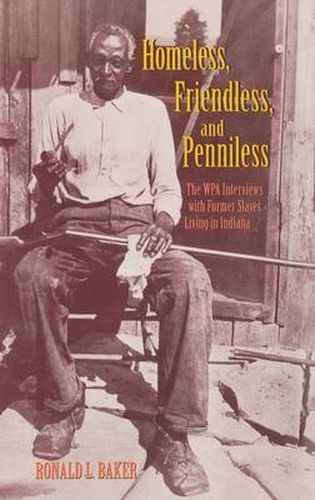Readings Newsletter
Become a Readings Member to make your shopping experience even easier.
Sign in or sign up for free!
You’re not far away from qualifying for FREE standard shipping within Australia
You’ve qualified for FREE standard shipping within Australia
The cart is loading…






This title is printed to order. This book may have been self-published. If so, we cannot guarantee the quality of the content. In the main most books will have gone through the editing process however some may not. We therefore suggest that you be aware of this before ordering this book. If in doubt check either the author or publisher’s details as we are unable to accept any returns unless they are faulty. Please contact us if you have any questions.
This volume is based on a collection of interviews with former slaves who lived in Indiana in the late 1930s. The interviews were conducted as part of Indiana’s contribution to a federal project undertaken in 17 states during the Great Depression. Over a three-year period, former slaves and, in some cases, descendants of former slaves, shared their memories with field-workers of the Federal Writers’ Project (FWP) of the Works Progress Administration (WPA), renamed the Work Projects Administration in 1939. As a result of this early fieldwork in folklore and oral history, today we have an invaluable record of the lives and thoughts of former slaves who moved to Indiana after the Civil War and made significant contributions to the evolving patchwork of Hoosier culture. The Indiana interviews are especially notable because they were collected from freed slaves living in a state that was free during the Civil War. Most of the other form slaves interviewed for the national project still lived in the South, very close to where they were held in bondage. The Indiana slave narratives provide a glimpse of slavery from the memories of those who experienced it and thus preserve insiders’ views of an unfortunate chapter in American history. Though the former slaves represented in the Indiana collection lived in Indiana at the time of the interviews, they were, of course, held in slavery in other states; therefore, the interviews reveal a variety of experiences of African Americans enslaved not in a single state but in eleven different states from the Carolinas to Louisiana, though most of them were slaves in Kentucky. The interviews deal with life and work on the plantation; the treatment of slaves; escaping from slavery; education, religion, and folklore of slaves; and recollections of the Civil War. Just as important, the interviews reveal how former slaves fared in Indiana after the Civil War and during the Depression. Some became ministers, a few became educators, and one became a physician; but many lived in poverty and survived on Christian faith and small government pensions.
$9.00 standard shipping within Australia
FREE standard shipping within Australia for orders over $100.00
Express & International shipping calculated at checkout
This title is printed to order. This book may have been self-published. If so, we cannot guarantee the quality of the content. In the main most books will have gone through the editing process however some may not. We therefore suggest that you be aware of this before ordering this book. If in doubt check either the author or publisher’s details as we are unable to accept any returns unless they are faulty. Please contact us if you have any questions.
This volume is based on a collection of interviews with former slaves who lived in Indiana in the late 1930s. The interviews were conducted as part of Indiana’s contribution to a federal project undertaken in 17 states during the Great Depression. Over a three-year period, former slaves and, in some cases, descendants of former slaves, shared their memories with field-workers of the Federal Writers’ Project (FWP) of the Works Progress Administration (WPA), renamed the Work Projects Administration in 1939. As a result of this early fieldwork in folklore and oral history, today we have an invaluable record of the lives and thoughts of former slaves who moved to Indiana after the Civil War and made significant contributions to the evolving patchwork of Hoosier culture. The Indiana interviews are especially notable because they were collected from freed slaves living in a state that was free during the Civil War. Most of the other form slaves interviewed for the national project still lived in the South, very close to where they were held in bondage. The Indiana slave narratives provide a glimpse of slavery from the memories of those who experienced it and thus preserve insiders’ views of an unfortunate chapter in American history. Though the former slaves represented in the Indiana collection lived in Indiana at the time of the interviews, they were, of course, held in slavery in other states; therefore, the interviews reveal a variety of experiences of African Americans enslaved not in a single state but in eleven different states from the Carolinas to Louisiana, though most of them were slaves in Kentucky. The interviews deal with life and work on the plantation; the treatment of slaves; escaping from slavery; education, religion, and folklore of slaves; and recollections of the Civil War. Just as important, the interviews reveal how former slaves fared in Indiana after the Civil War and during the Depression. Some became ministers, a few became educators, and one became a physician; but many lived in poverty and survived on Christian faith and small government pensions.